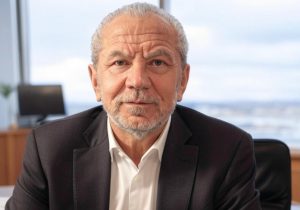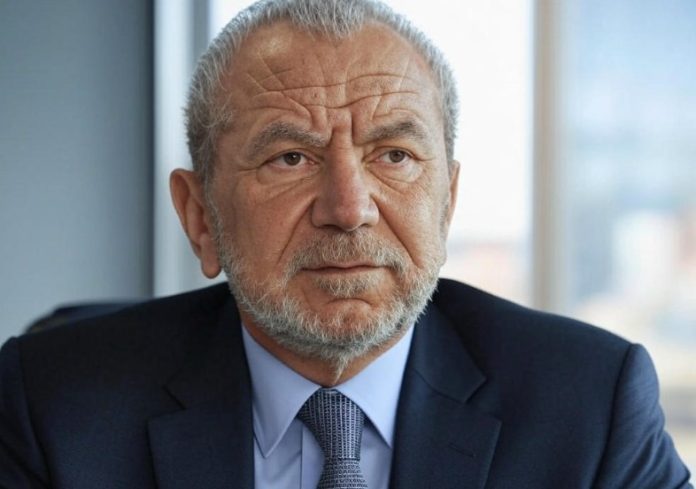Table of Contents
Alan Sugar’s rise from modest beginnings in East London to becoming one of the UK’s most recognised business figures is nothing short of remarkable.
Known for his sharp business mind, straight-talking style, and long-standing media presence, he remains an influential figure in British entrepreneurship.
As we explore his journey, investments, and business strategies, one question continues to surface among fans, aspiring entrepreneurs, and financial analysts alike — just how far has his fortune grown in 2025?
Who is Alan Sugar?

Alan Michael Sugar, born on 24 March 1947 in Hackney, East London, is one of the UK’s most prominent business magnates and public figures.
Best known for founding the electronics company Amstrad in 1968, Lord Sugar has built a reputation that spans business, media, and public service.
A self-made billionaire, Sugar is recognised not only for his commercial achievements but also for his influential role in British enterprise.
In 2009, he was granted a life peerage, taking the title Baron Sugar of Clapton, and has since served as a Lord Temporal in the House of Lords. Though formerly affiliated with the Labour Party, he has been a crossbench member since 2017.
His commitment to promoting entrepreneurship was formalised through his appointment as the UK’s Enterprise Champion to the Business Secretary.
He has held this role under a succession of Prime Ministers, beginning with David Cameron in 2016, and continuing under Theresa May, Boris Johnson, Liz Truss, Rishi Sunak, and currently Keir Starmer.
He also briefly held the post during Gordon Brown’s tenure from June 2009 to May 2010.
During his time as Enterprise Champion, Lord Sugar has worked alongside several Business Secretaries, including:
- Sajid Javid
- Greg Clark
- Andrea Leadsom
- Alok Sharma
- Kwasi Kwarteng
- Jacob Rees-Mogg
- Grant Shapps
- Kemi Badenoch
- Jonathan Reynolds
Beyond politics and business, Sugar is widely known for his role as the host of BBC’s The Apprentice, where he mentors aspiring entrepreneurs. He is also a published author, media personality, and a figure widely respected for his direct, no-nonsense approach.
Married to Ann Simons since 1968, with whom he shares three children, Alan Sugar continues to be an influential voice in British economic, media, and political life.
What is Alan Sugar’s Net Worth in 2025?
As of 2025, Lord Alan Sugar’s estimated net worth is £1.2 billion. His fortune places him among the UK’s wealthiest individuals.
The value of his assets has continued to grow due to his diversified investments and consistent involvement in high-value industries.
This figure reflects more than just financial accumulation — it speaks to Sugar’s ability to reinvent himself across multiple decades. His net worth has been built and sustained through a broad portfolio:
- Technology and electronics (primarily through Amstrad)
- Real estate and property holdings via Amsprop
- Media and television appearances
- Football club ownership and sports investments
While other entrepreneurs may ride trends or make quick exits, Sugar has remained a long-term player in each of his chosen sectors.
His approach to business has focused on calculated growth, risk control, and strong brand identity.
How Did Amstrad Contribute to Alan Sugar’s Wealth?
Amstrad was the foundation of Alan Sugar’s fortune. The company gained widespread success during the 1980s for producing low-cost consumer electronics that appealed to the masses.
Its range of products included amplifiers, tuners, personal computers, and satellite television set-top boxes.
One of Amstrad’s biggest milestones was the release of the Amstrad CPC and PCW range of computers.
These became household staples for thousands of Britons, especially during a period when computing was becoming essential both at home and in schools.
In 2007, Alan Sugar sold Amstrad to BSkyB (now Sky Group) for £125 million. This deal marked the end of his active involvement in the tech hardware sector but provided a significant boost to his already substantial net worth.
Even after Amstrad, the ethos of the company — high value at affordable cost — continued to influence Sugar’s future ventures.
What Are Alan Sugar’s Key Business Ventures Beyond Amstrad?

After exiting Amstrad, Sugar didn’t slow down. He pivoted to new business opportunities that would ensure the sustainability of his wealth and relevance.
One of his primary focuses became commercial property investment. Through Amsprop, his private property investment firm, Sugar accumulated a large and valuable real estate portfolio across London.
These properties include office blocks, retail units, and luxury developments, contributing heavily to his annual income and asset base.
He also ventured into media, becoming a key figure in British television. While initially approached for guest appearances, his role on The Apprentice UK solidified his status as a national figure.
His investments also extended to:
- Joint ventures with tech and software firms
- Startup funding for former Apprentice winners
- Short-term and long-term equity placements
These activities not only preserved his net worth but also allowed him to actively shape the next generation of British businesses.
How Has Lord Sugar Impacted British Media Through The Apprentice?
In 2005, Alan Sugar became a household name once again, this time through his role on BBC’s The Apprentice. Modelled after the US version featuring Donald Trump, the UK version adapted to British sensibilities and featured Sugar as the no-nonsense, straight-talking entrepreneur.
His commanding presence and hard-edged business style quickly made the show a hit. Each season, aspiring entrepreneurs competed for a partnership with Sugar, culminating in him investing £250,000 in the winner’s business idea.
The show has not only elevated Sugar’s personal brand but also helped him stay culturally relevant. It acts as a platform for real-world business lessons and has produced several successful enterprises, many of which he continues to hold equity in.
Sugar’s influence in media extends to regular interviews, opinion pieces, and public appearances where he comments on British business, the economy, and entrepreneurship.
What Was Alan Sugar’s Role in Football and Tottenham Hotspur?
From 1991 to 2001, Alan Sugar served as chairman of Tottenham Hotspur Football Club. His entry into football came at a time when clubs were beginning to be run as serious businesses rather than community-owned teams.
Under his leadership, Tottenham saw significant financial investment. Sugar brought in new management systems, improved the club’s financial stability, and invested in stadium improvements and player acquisitions.
His tenure wasn’t without controversy. Some fans criticised his approach, believing he treated the club too much like a business and not enough like a sporting institution.
Nevertheless, Sugar stabilised Tottenham at a crucial time in its history and laid groundwork that would benefit future leadership.
After leaving the club, he exited the football world entirely but remains a recognised figure in the sport’s business side.
What Political and Government Roles Has Alan Sugar Held?

Lord Sugar’s business acumen earned him recognition from the British government. In 2009, he was made a life peer as Baron Sugar of Clapton, joining the House of Lords as a non-party-political appointee.
Initially affiliated with the Labour Party, he later became a crossbencher, independent of any political alignment.
Sugar’s government service includes his appointment as Enterprise Champion to the Business Secretary, a role focused on promoting entrepreneurship in the UK.
He has served under several Prime Ministers — from Gordon Brown to the current administration under Keir Starmer — reflecting a degree of bipartisan respect for his insights on enterprise and job creation.
While not a politician in the traditional sense, Sugar’s advisory roles have allowed him to influence policy, especially in areas related to small businesses, apprenticeships, and enterprise support.
What Lessons Can Aspiring Entrepreneurs Learn from Alan Sugar?
Alan Sugar’s journey is rich with practical lessons for aspiring entrepreneurs. He is proof that success doesn’t require elite education or extensive capital at the outset — rather, it demands vision, consistency, and hard work.
Key takeaways include:
- Focus on Value Creation: Sugar always sought to create products that offered value to the masses.
- Adaptability: His transition from electronics to property, to media and sports, demonstrates the importance of flexibility.
- Long-Term Vision: He never relied on quick wins. His wealth was built patiently, with an eye on sustainability.
- Personal Branding: By maintaining visibility through media, Sugar ensured that his influence extended far beyond the boardroom.
These lessons are particularly relevant in today’s fast-paced business environment where adaptability and resilience are key.
How Does Alan Sugar’s Net Worth Compare with Other UK Business Tycoons?
Lord Sugar’s net worth places him among Britain’s most recognised business figures, although not at the very top of the wealth charts.
Entrepreneurs like Sir James Dyson and Sir Richard Branson command higher fortunes, largely due to their global operations and large-scale private holdings.
What sets Sugar apart, however, is his self-made status and consistent engagement across different industries.
His wealth was not inherited, and unlike tech unicorn founders, he didn’t rely on venture capital. Every business move was backed by earned capital, strategic risk-taking, and an eye for market trends.
In comparison to his peers:
- He’s less diversified globally but deeply embedded in the UK’s economic and media landscape.
- His assets are largely in tangible sectors such as property and media rights.
- He maintains a high public profile, making him one of the most recognisable business personalities in Britain.
What’s Next for Alan Sugar in 2025 and Beyond?
In 2025, Lord Sugar remains active, with no signs of slowing down. His television role continues, and he maintains a keen interest in property and startup investments.
Future endeavours are expected to include:
- Expansion of Amsprop’s real estate portfolio
- Continued involvement in The Apprentice
- Thought leadership through speaking engagements and publications
- Ongoing participation in House of Lords discussions related to business and enterprise
He continues to be a vocal advocate for British business, particularly in supporting local entrepreneurship and economic resilience. Even at 78, Sugar’s influence is as sharp as ever — a testament to the longevity of his legacy.
What is the Projected Net Worth of Alan Sugar in 2026?

As we look ahead to 2026, Lord Alan Sugar’s financial trajectory remains steady, backed by a robust portfolio across property, media, and private equity.
Given current market trends and the consistent performance of his ventures, his net worth is projected to rise to approximately £1.25 billion by the end of 2026.
This projection takes into account several factors:
- Ongoing property value appreciation through Amsprop, particularly in high-demand London real estate markets
- Revenue from The Apprentice UK, which continues to perform strongly on BBC, securing media and endorsement income
- Returns from investments in startup businesses, especially those launched through The Apprentice
- Minimal exposure to high-risk ventures, which supports long-term capital preservation
Although market fluctuations can impact short-term figures, Lord Sugar’s conservative investment strategy and asset-backed wealth give him a degree of insulation from economic volatility.
With the UK property market showing signs of stabilised growth and media revenues holding firm, his net worth is expected to increase modestly but consistently.
| Year | Estimated Net Worth |
| 2023 | £1.15 billion |
| 2025 | £1.2 billion |
| 2026 (Projected) | £1.25 billion |
Alan Sugar’s financial growth is not just a reflection of market movements but also a testament to disciplined business practices and long-term vision.
As he continues to play a significant role in UK enterprise and media, his influence—both financial and cultural—is set to remain strong well into the coming years.
Conclusion
Alan Sugar’s legacy is built not just on financial success, but on resilience, innovation, and an unwavering entrepreneurial spirit.
From founding Amstrad to mentoring aspiring business owners on national television, his journey reflects the evolving face of British enterprise.
With a diversified portfolio and a continued presence in the media and public service, Lord Sugar remains a symbol of what’s possible with ambition and determination. His financial journey continues to inspire, challenge, and captivate those who follow in his footsteps.
FAQs About Alan Sugar’s Wealth
How did Alan Sugar become a billionaire?
Alan Sugar became a billionaire primarily through the success of Amstrad, a consumer electronics company he founded in 1968. He later expanded into property, media, and sports.
Is Alan Sugar still involved with The Apprentice UK?
Yes, he remains the central figure on the BBC’s The Apprentice and continues to invest in the winners’ businesses.
What kind of property investments does Alan Sugar have?
Sugar owns a large commercial real estate portfolio through his company Amsprop, with properties mainly located in central London.
Does Alan Sugar have any involvement in technology today?
While he’s no longer involved in manufacturing tech products, Sugar remains active in investing in tech-based startups, particularly through The Apprentice.
Was Alan Sugar ever involved in politics?
Yes, he served as Enterprise Champion to the UK government and became a life peer in the House of Lords in 2009.
How has Alan Sugar’s net worth changed over the years?
His net worth has steadily increased, from under £1 billion in 2020 to an estimated £1.2 billion in 2025, thanks to consistent investments and brand presence.
Is Alan Sugar’s wealth self-made?
Yes, his entire fortune was built from the ground up, starting with small-scale electronics sales, making him one of the UK’s most successful self-made businessmen.


